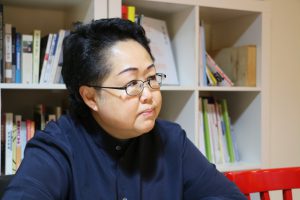Ho Hau-cheung, who has been chairman of the Sha Tin District Council since 2012, says the sum being offered is nothing compared to other major infrastructure projects. Ho says he believes the scheme is a trial to see if district councils are capable of planning a HK$100 million project. “I believe that the SPS is a pilot for the district councils to make their own decisions,” says Ho.
However, he adds that the scheme does not mean district councils actually have more power because the real power is still in the hands of the Legislative Council, which can approve or reject the project. “When those problems reach the Legco, consultations are time-consuming, especially if there is filibustering,” says Ho.
The Sha Tin District Council has agreed to carry out two projects, the revitalisation of the Shing Mun River promenade and the construction of a five-a-side soccer pitch on a deck over the river. But the Legislative Council needs to review these two projects one by one.
Ho says that as the two projects cannot be combined, construction companies need to bid for them separately and cannot carry out the projects at the same time. This adds time and cost to the projects. “In the end, this will probably lead to [the projects going] over budget.”
Overall, Ho thinks the Signature Project Scheme is good for district councils and communities but he says the government needs to do more to increase the administrative power of the district councils. “How can district issues be addressed at district level when it holds such limited power?” asks Ho.
Chung Kim-wah, assistant professor in the department of Applied Social Sciences at the Hong Kong Polytechnic University, agrees the district councils are little more than talking shops due to their lack of decision-making power. According to Chung, this lack of authority is not their only shortcoming.
He points out the size of some of the 431 district council constituencies is very small, and may cover just a few blocks. This makes it difficult to reach a consensus within any district council, especially when the issue involves unwanted facilities like columbaria. “All kinds of reforms are quite difficult because of the interest of each small community which is trying to protect their own benefits,” explains Chung.
The problem is exacerbated when district councillors are seeking re-election, as they will strive to safeguard the interests of their potential voters. Chung says this tends to translate into handing out material benefits to the residents rather than engaging in long-term planning for the community, as the results of the latter may not be seen before the next election.
Although Chung agrees the lack of real authority is a problem for the district councils, he spots a potential pitfall in granting the local bodies more power without stepping up supervision. He points out the pro-establishment camp dominates the district councils and as he sees it, “they [the pro-establishment camp] are trying to loosen up regulations and guidelines to get as many benefits as possible.”
More resources for the district council could favour the pro-establishment camp and allow them to stabilise their support, he adds.
Still, there is little sign of any major reform to the district councils in the foreseeable future. However, the former chairperson of the Wan Chai District Council, Ada Wong Ying-kay, believes that even under the existing system, there is still room to imagine a better district council and better community organisation.

Wong served as the district councillor for the Broadwood constituency between 2000 and 2007 and chaired the Wan Chai District Council between 2004 and 2007. Her leadership of the body was hailed as a success.
During Wong’s term, Wan Chai established Hong Kong’s first dog park, a move that came about after Wong mobilised residents’ awareness of the issue and worked with various government departments to make it happen.









































